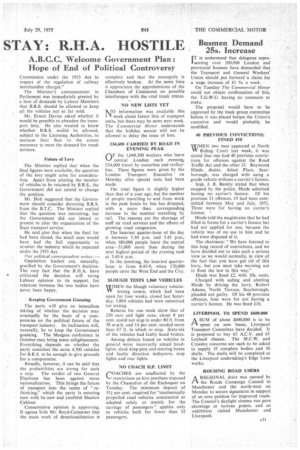STAY: R.IFT.A. HOSTILE
Page 37

If you've noticed an error in this article please click here to report it so we can fix it.
A.B.C.C. Welcome Government Plan : Hope of End of Political Controversy
Commission under the 1953 Act in respect of the regulation of railway merchandise charges?'
The Minister's announcement in Parliament was immediately greeted by a host of demands by Labour Members that B.R.S. should be allowed to keep all the vehicles not so far sold.
Mr. Ernest Davies asked whether it would be possible to abandon the transport levy. He also wanted to know whether B.R.S. wofild be allowed, subject to the Licensing Authorities, to increase their fleet to the extent necessary to meet the demand for trunk services.
Future of Levy
The Minister replied that when the final figures were available, the question of the levy might arise for consideration. Apart from altering the number of vehicles to be retained by B.R.S„ the Government did not intend to change the position.
Mr. Holt suggested that the Government should consider divorcing B.R.S. from the B.T.C. The Minister replied that the question was interesting, but the Government did not intend at present to alter the organization of the State transport service.
He said also that when the final list had been closed, the small man would have had the full opportunity to re-enter the industry which he expected under the 1953 Act.
Our political correspondent writes:—
Opposition leaders are, naturally, gratified by the Government's decision. The very fact that the R.H.A. have criticized the decision will swing Labour opinion to its support, for relations between the two bodies have never been happy.
Keeping Government Guessing
The party will give no immediate inkling of whether the decision may eventually be the basis of a compromise on the political future of the transport industry. Its inclination will, naturally, be to keep the Government guessing. The Margate conference in October may bring some enlightenment. Everything depends on whether the party considers the extra 4,500 vehicles for B.R.S. to be enough to give grounds for a compromise.
Broadly, however, it can be said that the probabilities are strong for such a step. The verdict of two General Elections has been against more nationalization. This brings the future of transport into the realm of "rethinking," which the party is entering now with its new and youthful Shadow Cabinet.
Conservative opinion is approving. It agrees ivith Mr. Boyd-Carpenter that the main work of denationalization is complete and that the monopoly is effectively broken. At the same time it appreciates the apprehdrisions of the Chambers of Commerce on possible interferer= with the vital trunk roittes.
NO NEW LISTS YET
mo information was available this 1I week about future lists of transport units, but there may be news next week. The Commercial Motor understands that the holiday season will not be allowed to delay the issue of lists.
234,600 CARRIED BY ROAD IN EVENING PEAK
(IF the 1,048,500 workers who leave
central London each evening, 234,600 travel by motorbus and trolleybus. These figures were given by the London Transport Executive ' on Monday after special tests had been made.
The total figure is slightly higher than that of a year ago, but the number of people travelling to and from work in the peak hours by bus has dropped, with a more than corresponding increase in the number travelling by rail. The reasons are the shortage of staff on road services and the effects of growing road congestion.
The heaviest quarter-hour of the day is between 5.30 p.m. and 5.45 p.m., when 180,000 people leave the central area-33,000 more than during the next highest period of the evening rush at 5.45-6 p.m.
In the morning, the heaviest quarterhour is from 8.45-9, when 170,000 people enter the West End and the City.
SLOUGH TESTS 1,860 VEHICLES
WHEN the Slough voluntary vehicletesting centre, which had been open for four weeks, closed last Saturday, 1,860 vehicles had been submitted for testing.
Returns for one week show that of 230 cars and light vans, about 8 per cent. could not stop in under 80 ft. from 30 m.p.h. and 14 per cent, needed more than 67 ft. in which to stop. Sixty-six of the vehicles had faulty hand brakes.
Among defects found on vehicles in general were: incorrectly aimed headlights. slack king-pins and steering boxes and faulty direction indicators, stop lights and rear lights.
NO COACH H.P. LIMIT
rOACHES are unaffected by the restrictions on hire purchase imposed by the Chancellor of the Exchequer on Tuesday. The minimum deposit of 331 per cent. required for "mechanically propelled road vehicles constructed or adapted solely or mainly for the carriage of passengers" applies only to vehicles built for fewer than 12 passengers.
































































































